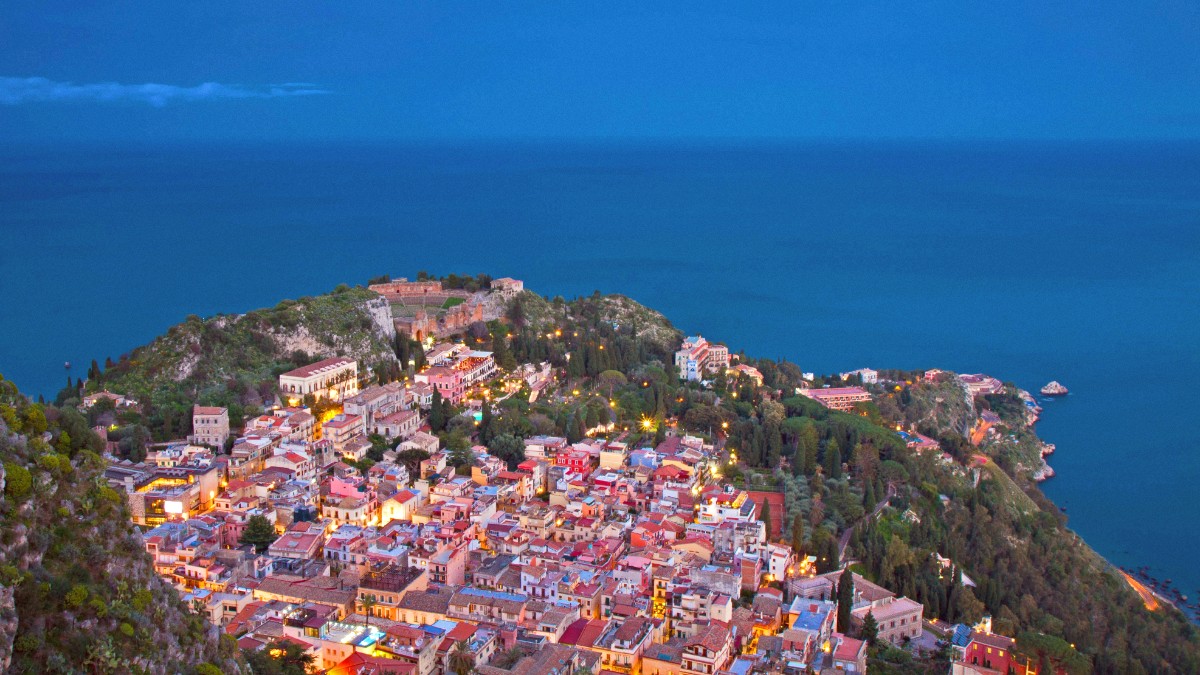
Sicily, Italy
Taormina enjoys a Mediterranean climate, marked by hot, dry summers and mild, wet winters. Spring (April-May) and Autumn (September-October) average 15-27°C (59-81°F) with low to moderate precipitation, great for sightseeing. Summer (June-August) averages 25-32°C (77-90°F), offering high sunshine, minimal precipitation, ideal for beaches. Winter (November-March) averages 10-16°C (50-61°F), cooler with higher precipitation.
Heatwaves can occur during summer, pushing temperatures to extreme highs. Rain during winter tends to be heavy but often short-lived.
Italy is a member of the Schengen Area, simplifying travel for many nationalities. Citizens of non-EU/EEA countries (e.g., U.S., Canada, Australia, New Zealand, UK) typically enter for tourism for up to 90 days within any 180-day period without a visa.
Your passport must be valid for at least three months beyond your planned departure from the Schengen Area, issued within the last 10 years, and have at least two blank pages. You may show proof of departure, accommodation, and sufficient funds. Travel insurance is required for Schengen visa applications and strongly recommended for all travelers. Companies like World Nomads or SafetyWing offer suitable policies, as does Insubuy.
Visa requirements can change.
Check the latest entry requirements with the Italian embassy or consulate in your country.
For stays longer than 90 days, or for purposes other than tourism, a specific long-stay visa is needed. Apply well in advance.
Prepare these for entry.
Demonstrate sufficient financial means and provide hotel bookings or invitation letters.
You may show proof of your departure from the Schengen Area.
General considerations.
Ensure these are current. No specific health-related entry requirements are currently in place.
In case of delayed or canceled flights, AirHelp may assist with compensation claims.
Italy uses the Euro (€). ATMs ("Bancomat") are widely available. Most hotels, restaurants, and larger shops accept major credit cards (Visa, Mastercard, American Express). Carrying some cash is advisable for smaller purchases, local markets, or some street food vendors. Inform your bank of your travel plans.
Hostel bed: €25-€40. Mid-range 3-star hotel: €80-€150. Luxury 4-5 star hotel: €200-€800+. Pizza slice: €3-€7. Casual trattoria meal: €15-€25. Mid-range restaurant: €30-€50. Espresso: €1.20-€2.00. Gelato: €3-€6. Local bus ticket: €1.90. Cable car: €3 (single), €10 (return). Ancient Greek Theatre: €10-€13. Isola Bella: €5.
€80-€140 (hostel/B&B, street food/self-catering, local bus/walking, 1-2 paid sites).
€160-€290 (3-star hotel/guesthouse, casual dining, bus/occasional taxi, multiple sites/activities).
€380+ (4-5 star hotel/villa, fine dining, private transfers/frequent taxis, private tours/exclusive experiences).
Not widely expected as in the USA. A "servizio" or "coperto" may be included. Round up or leave a few euros for good service.
Eat like a local, use public transport, buy groceries, carry a Reusable water bottle (tap water is safe), visit during shoulder/low season.
Access to healthcare and emergency services is readily available. The unified European emergency number for police, ambulance, and fire services is 112.
Hospitals like "Ospedale San Vincenzo" in Taormina provide emergency services. Pharmacies ("Farmacia") are widespread and offer advice for minor ailments.
Comprehensive travel insurance is strongly recommended for all travelers. Ensure your policy covers medical emergencies, emergency evacuation, trip cancellation/interruption, and lost luggage.
Tap water in Taormina is safe to drink in most places. Food hygiene standards in restaurants are high. Maintaining good food hygiene practices, like washing hands before eating, is always a good idea.
A well-stocked personal health kit and awareness of local services aid a smooth trip.
Anti-diarrhea medication (e.g., Imodium) and indigestion remedies.
Cream for insect bites, rashes, or minor skin irritations. Consider a compact Adventure Medical Kits Ultralight & Watertight .3 First Aid Kit.
Carry all prescription medications in original, labeled packaging.
Bring enough for your entire trip, plus a few extra days. Have a copy of your prescription and a doctor's note explaining your need for the medication, especially for controlled substances.
While pharmacies are well-stocked, bringing your preferred brands for common issues provides convenience.
Consult your doctor or a travel clinic at least 4-6 weeks before your trip for personalized vaccination advice.
Be aware of your surroundings, especially in crowded tourist areas like Corso Umberto or at busy bus stations.
Utilize a Money belt or a cross-body bag. Avoid openly displaying large amounts of cash or expensive jewelry.
Do not leave valuables unattended on beaches, in cafes, or in easily accessible pockets.
While Taormina is safe, awareness of natural risks and common petty crime enhances safety.
Comprehensive travel insurance is strongly recommended for financial protection and peace of mind. Keep emergency contacts handy.
Ensure coverage for medical emergencies, evacuation, and trip disruptions. Check if activities like Etna hiking are covered.
Dial 112 for all emergencies (police, ambulance, fire). For lost passports, contact your country's embassy or consulate.
Pharmacies are identified by a green cross. Ospedale San Vincenzo provides emergency services locally.
Keep the contact information for your embassy or consulate readily available for consular assistance.